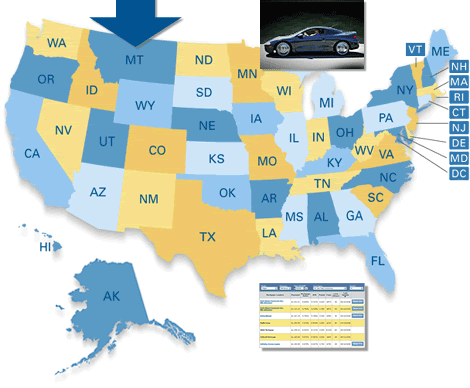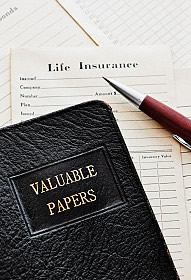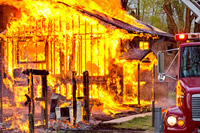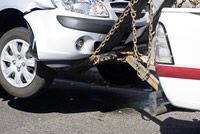Filing a Car Insurance Claim: Steps to Follow in Case of an Accident
by Amy Lillard
(04/26/2012) Auto insurance is your protection against the costs and damage of auto accidents, theft, and other damage. So when these situations happen, how do you get that protection?

In order to get reimbursed and/or covered for any damage from accidents and other incidents, all car insurance policy holders must file a claim. Simply put, the process is this: a policy holder makes a claim, a claims adjuster comes out to survey the damage and estimate the cost to repair that damage, and the insurance company sends you a check to pay for repairs.
Of course, filing a claim is often a little more complex. In case of an accident, the auto insurance company will require several elements of proof to document damage, injury, and fault. To get these elements of proof, and to ensure you get the maximum available to you from the company, use this checklist at an accident.
-
• Call the police to start the process of getting a police report. This report goes a long way towards assessing fault in the case of an accident. You may receive more or less coverage from your car insurance company depending on who is determined at fault, and what kind of policy you have.
• Exchange factual information with other drivers involved. You will need at a minimum license plate numbers, contact information, auto insurance information, and phone numbers. Important to remember - keep your communication to just this information, and never admit fault to other drivers.
• Seek out witnesses to get the full picture. If other people saw the accident occur, their impartial report can help you and police ensure all the details are accurate. Witness reports have an impact on auto insurance company's ultimate decisions.
• Contact your insurance company as soon as possible. Access the appropriate number by consulting your insurance ID card (which you should keep in your car or on your person at all times). Calling your company right away will speed up the claims process; plus, the person you talk to you can help guide you through all of these steps to ensure the most complete claim possible.
After an accident, the other insurance company representing the other driver may call you. Be sure to prepare for this by asking your own insurance company how to handle the call and which statements to include or avoid.
To process your own claim, a claims adjuster will come to your home or site to assess your vehicle and make a recommendation on the amount it will take to restore or replace it. In some cases, car insurance companies have agreements with an auto shop with which they have an agreement. That shop can assess the damage and start repairs immediately. Payments from the auto insurance company can also be submitted directly to the shop.
Following these steps and remembering these simple things can help ensure you receive the most appropriate reimbursement from your car insurance after an accident.
 A frequent contributor to ERATE® since 2006, Amy Lillard is a freelance writer specializing in turning complex information into useful tips and tricks for readers. For questions or topic suggestions, contact Amy at [email protected].
A frequent contributor to ERATE® since 2006, Amy Lillard is a freelance writer specializing in turning complex information into useful tips and tricks for readers. For questions or topic suggestions, contact Amy at [email protected].
Other Articles:
Shopping Prep: What You'll Need to Obtain Car Insurance Quotes
Auto Insurance Quotes and Policies: Commonly Used Terms
Understanding Your Auto Insurance Quotes: The 7 Types of Car Insurance
Car Insurance Quotes Demystified: What Factors Determine Rates
Car Insurance Quotes: Discovering the Best Deals
Avoid advertised auto trade-in, loan pay-off rip-offs
Hitting the brakes on auto insurance costs
Auto insurance settlement advice
Slow down, drive safely, save on auto insurance
Driving a hard bargain on car insurance
New and Used Auto Loan Rates
Choose Your State Below

Start by selecting your state

Life Insurance
- Term, Whole, Universal, Varialble Life Insurance
- Guidelines for Purchasing Life Insurance
- Life Insurance: Finding the Best Rates
- Life Insurance Explained: Types and Coverage

Medical Insurance
- Health Insurance Basics
- Healthcare Costs and Retirement
- Critical Flaws in HealthCare
- Disability Insurance
- Tips on Buying Long Term Care Insurance
General Insurance Articles

Homeowners Insurance
- Homeowners Insurance Premiums Policy
- Homeowners Insurance: Filing a Claim
- Punxsutawney Phil's forecast-homeowners insurance rates
- Homeowners Insurance Costly Trends
- Home Insurance Costs on the Rise, Coverage Options Decrease
- Homeowners Insurance: The Special Policy for Condo Owners
- Homeowners Insurance College Students Coverage
- Underinsured Homeowners
- Beyond Homeowners Insurance: Coverage for Renters
- What Home Owners Insurance Do You Need? Tips for the Best
- Home Insurance Quotes: Types of Home Owners Insurance
- Home Insurance: How are Insurance Quotes Determined?
- Homeowners Insurance: Finding the Best Quotes


Auto Insurance

- Hitting the brakes on auto insurance costs
- Car Insurance Quotes: Discovering best deals
- Car Ins Quotes: What Factors Determine Rates
- Auto Insurance Quotes and Policies: Commonly Used Terms
- Shopping Prep: What You'll Need to Obtain Car Insurance Quotes
- Auto Insurance Terms & Descriptions
- Understanding Your Auto Insurance Quotes: The 7 Types of Car Insurance
- Auto Insurance - Best Plan for You
- How much Car Insurance to buy
- Need to Know Auto Ins Policy
- Automobile Insurance Settlement Advice
- Managing Auto Insurance: What to Do After an Accident
- Filing a Car Insurance Claim: Steps to Follow after an Accident
- Auto Insurance Steps to Filing a Claim
- Tips - Reducing your Auto Insurance Expenses
- Driving a Hard Bargain
- Slow Down Drive Safely
- Cheapest & Most Expensive Vehicles to Insure
